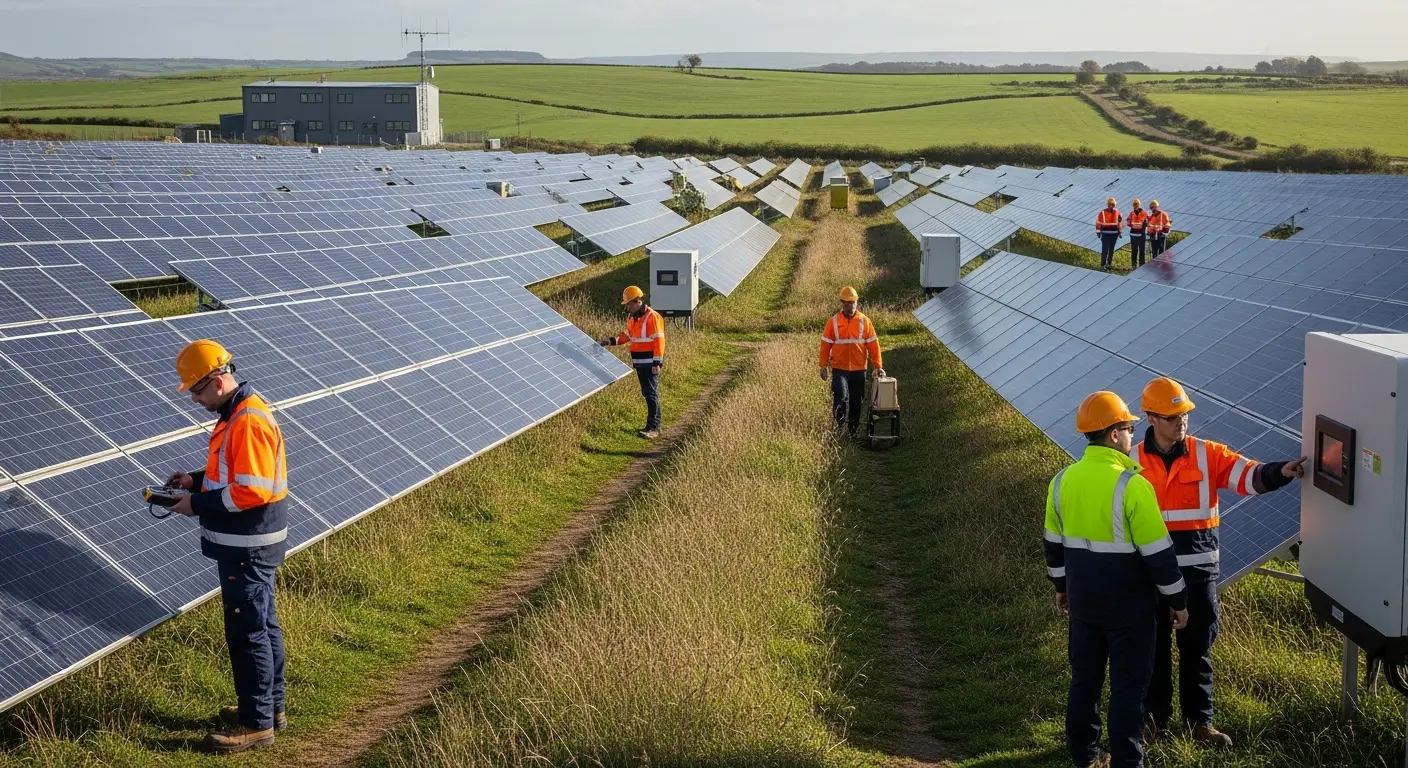The UK’s commitment to net-zero emissions has ignited a colossal surge in solar energy adoption.
While the image of a solar panel installer might first come to mind, the truth is, this burgeoning sector offers a far wider array of exciting, high-tech, and well-paid career opportunities.
The industry isn’t just growing; it’s evolving, creating a demand for diverse skill sets.
Are you ready to discover where your talents could shine, read Astute’s latest blog on 5 unexpected career paths in the solar industry.
1. The Data Whisperers: Solar Energy Data Analysts & Optimisation Specialists
The efficiency of solar farms and individual installations is increasingly reliant on data.
These professionals analyse performance metrics, identify anomalies, predict energy output, and optimise systems using advanced analytics, machine learning, and AI.
They turn raw data into actionable insights, ensuring maximum energy generation and cost efficiency.
Why it’s growing
As solar farms become larger and more complex, and smart grids emerge, the need for sophisticated data management is paramount.
Predictive maintenance and performance optimisation are key to profitability.
Growth of AI in renewables
Artificial intelligence (AI) and machine learning (ML) are becoming increasingly important in the renewable energy sector, with applications ranging from predictive maintenance and grid optimisation to energy trading and forecasting.
For instance, UK Research and Innovation (UKRI) is actively funding AI-powered research and development for the energy sector, highlighting the critical role of data and AI in future energy systems.
Average Salary (UK)
Entry-level roles might start around £30,000-£40,000, with experienced specialists earning £50,000-£70,000+.
These are average ranges based on current UK job market data from sites such as Glassdoor.
Skills Needed
Strong analytical skills, proficiency in Python/R, SQL, data visualisation tools, understanding of energy systems.
2. Architects of the Grid: Grid Integration Engineers
With more intermittent renewable energy sources connecting to the National Grid, these engineers are critical.
They design and implement solutions to ensure the stable and efficient integration of solar power into the existing electricity infrastructure.
This involves understanding grid dynamics, power electronics, and smart grid technologies.
Why it’s growing
The UK aims for a decarbonised power system by 2035.
Seamless grid integration of renewables is the bottleneck.
Grid Modernisation
National Grid ESO (Electricity System Operator) is actively working on projects to modernise the grid and improve its capability to handle increasing volumes of renewable energy, including significant investments in grid infrastructure.
NESO’s “Future Energy Scenarios” reports detail these crucial developments.
Demand for Skills
The energy transition requires a new generation of engineers with expertise in power systems, control engineering, and digital technologies to manage a more distributed and dynamic grid.
Reports from organisations like Engineering UK and the Energy Institute frequently highlight these emerging skills needs.
Skills Needed
Electrical engineering degree, power systems knowledge, experience with grid codes, simulation software.
3. The Innovators: Solar R&D Scientists & Engineers
This involves pushing the boundaries of solar technology itself.
From developing more efficient photovoltaic (PV) materials (e.g., perovskites, bifacial cells) and advanced inverter technologies to designing novel energy storage solutions (batteries, hydrogen), these roles are at the forefront of innovation.
Why it’s growing
Continuous innovation is vital for reducing costs, improving efficiency, and expanding the applications of solar power.
The UK has a strong research base.
UK R&D Investment
The UK government has pledged significant investment in green technologies, including solar, through initiatives like the Net Zero Innovation Portfolio (NZIP), driving demand for research and development professionals.
Perovskite Solar Cells
UK universities and spin-out companies are at the cutting edge of perovskite solar cell research, promising higher efficiencies and lower manufacturing costs than traditional silicon.
Companies like Oxford PV, a spin-out from the University of Oxford, are leading the way.
Skills Needed
PhD/Masters in materials science, physics, electrical engineering, chemistry, strong research and analytical capabilities.
4. Sustainability & Compliance Consultants
As solar projects scale, navigating complex regulations, environmental impact assessments, and securing planning permission becomes crucial.
These consultants ensure projects are developed sustainably, comply with all environmental laws, and meet social responsibility criteria.
They bridge the gap between technical teams and regulatory bodies.
Why it’s growing
Increased scrutiny on large-scale renewable projects necessitates expert guidance on environmental, social, and governance (ESG) factors.
Planning Challenges
Navigating planning permission and environmental regulations remains a significant hurdle for large-scale solar developments in the UK, highlighting the demand for specialists in this area.
Recent analyses by organisations like Carbon Brief have detailed these challenges.
ESG Importance
Investors and developers are increasingly prioritising ESG factors in renewable energy projects, making expertise in sustainability reporting and compliance highly sought after.
Major consulting firms like PwC and EY frequently publish reports on the growing importance of ESG in the energy sector.
Skills Needed
Environmental science, planning law, project management, strong communication, understanding of UK regulations.
5. Digital Sales & Marketing Strategists for Solar
The residential and commercial solar markets are highly competitive.
These professionals are responsible for driving lead generation, customer acquisition, and brand building through digital channels (SEO, PPC, social media, content marketing, CRM).
They translate complex technical information into compelling narratives for consumers and businesses.
Why it’s growing
The solar market is becoming increasingly consumer-driven.
Effective digital outreach is essential for companies to stand out and reach potential customers.
Residential Solar Growth
UK homeowners are increasingly adopting solar PV, driven by rising energy costs and environmental concerns, creating a robust market for customer acquisition strategies.
The Microgeneration Certification Scheme (MCS) provides regular data on certified installations, demonstrating this growth.
Digital Marketing Spend
Companies across industries are significantly increasing their digital marketing spend to reach customers online, and the solar sector is no exception.
This reflects a broader trend of businesses investing heavily in online presence.
Skills Needed
Digital marketing expertise, SEO/SEM, content creation, CRM management, understanding of solar products and sales cycles.
UK Solar: Dynamic, Innovative & Rapidly Expanding
The UK solar industry is clearly much more than just putting panels on roofs.
It’s a dynamic, innovative, and rapidly expanding sector that’s hungry for diverse talent. If you’re looking for a career with purpose, growth potential, and a chance to contribute to a greener future, exploring these ‘unexpected’ paths might just be your brightest idea yet. Start researching, skilling up, and get ready to be part of the energy revolution!
Ready to launch your solar career?
Explore Astute People’s latest solar job listings or subscribe to Astute’s LinkedIn newsletter to get industry insights!
Other solar blogs you may enjoy


















